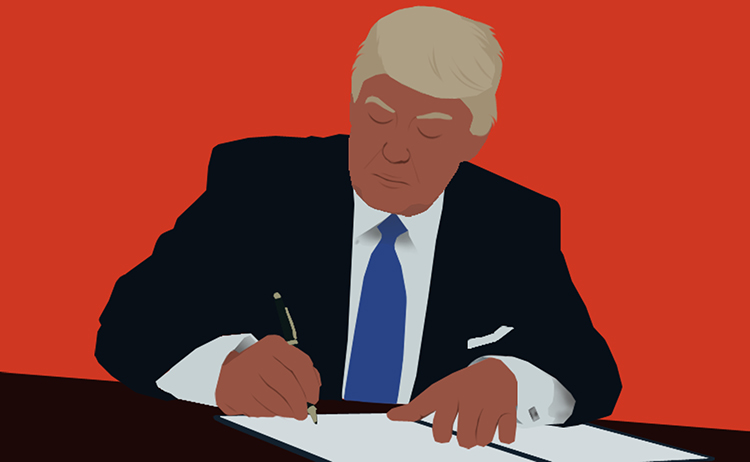Executive orders have been highly questioned over the years as to whether or not they are constitutional.
Although executive powers are covered in Article II, Section 1 of the constitution, the process itself does not follow the proper protocol commanded in the document. There is no need for approval from the Senate or the House of Representatives, making the law of checks and balances useless.
This is a problem. Executive powers have been abused since its creation and there needs to be a change in this system to avoid the abuse of power.
These orders are required to go under judicial review to determine whether or not they violate the constitutional rights of the people. But that still isn’t enough.
The main point of executive orders was to grant the president certain powers during a “time of crisis.” What constitutes a time of crises is isn’t clearly defined, which allows the abuse of a great power.
I find there is almost no reason for a president to use these powers and it’s shown with the recent orders that President Donald Trump has executed.
Executive orders are only backed by the political party that issues them. The same people that called Obama a tyrant for his use of the executive order are willing to praise Trump for the same actions.
It’s easy to point out problems like this, but finding solutions is the real challenge. Not much has been done to try and change this system because it would undermine the powers of the president. A possible solution is to set a limit to the number of orders the president can create.
The problem is, if the U.S. were to be in an actual time of crisis: war, famine or poverty it should be open for intervention. Once the president has used up all of his executive orders for his term, then there should not be the ability to issue more.
Historically, there are some executive orders that are now looked at as repulsive. No one would actively support internment camps or the establishment of Indian reservations in society today, but at the time people were willing to support them.
This simply means that people can be wrong. Maybe limiting the number of orders a president can issue would not have helped in the past, but it could make a president more selective when addressing issues and conscious of what it means to be in “crisis.”
A complete abolishment of the executive order is probably the more radical solution, but as much as we may disagree with a certain law, sometimes it is necessary for the safety of the nation.
The ability of presidents to undermine the entire constitutional system of checks and balances is something that needs to be changed and will only change when people use their voice to speak against the injustice and limit the power of executive orders.
Roberto Fonseca can be reached at opinioneditor@gmail.com or @rjfonseca13 on Twitter.







Smithd230 // Nov 6, 2017 at 5:07 am
I appreciate, cause I found just what I was looking for. You have ended my 4 day long hunt! God Bless you man. Have a nice day. Bye cgaddacaeddggdde
Yeah, You're Wrong. // May 10, 2017 at 3:28 pm
Article II vests the President with the duty to enforce the law. Executive orders are party of that because they provide a way to enact policies in the pursuit of executing law. Judicial review is sufficient to maintain the balance of powers because the President must have approval from Congress and cannot violate a provision of the Constitution. An order like the one that established Japanese internment camps would not be upheld today because it is a clear violation of due process and the courts have recognized it as such. The fact that judicial review has failed in the past doesn’t mean that the larger authority should disappear. A lot of the outrageous orders you hear about are overturned in court so the fact that some have somehow been upheld is not good enough to take away the power. Look at other important authorities like Congress’s Commerce Clause Power. It has been abused in ways that we no longer view as constitutional, like preventing farmers from growing wheat for their own use, but the power is important because it creates a national economy and maintains unity between the states. Relative to the amount of executive orders that are issued and overturned, the number of ones upheld despite a clear lack of constitutionality are extremely small.